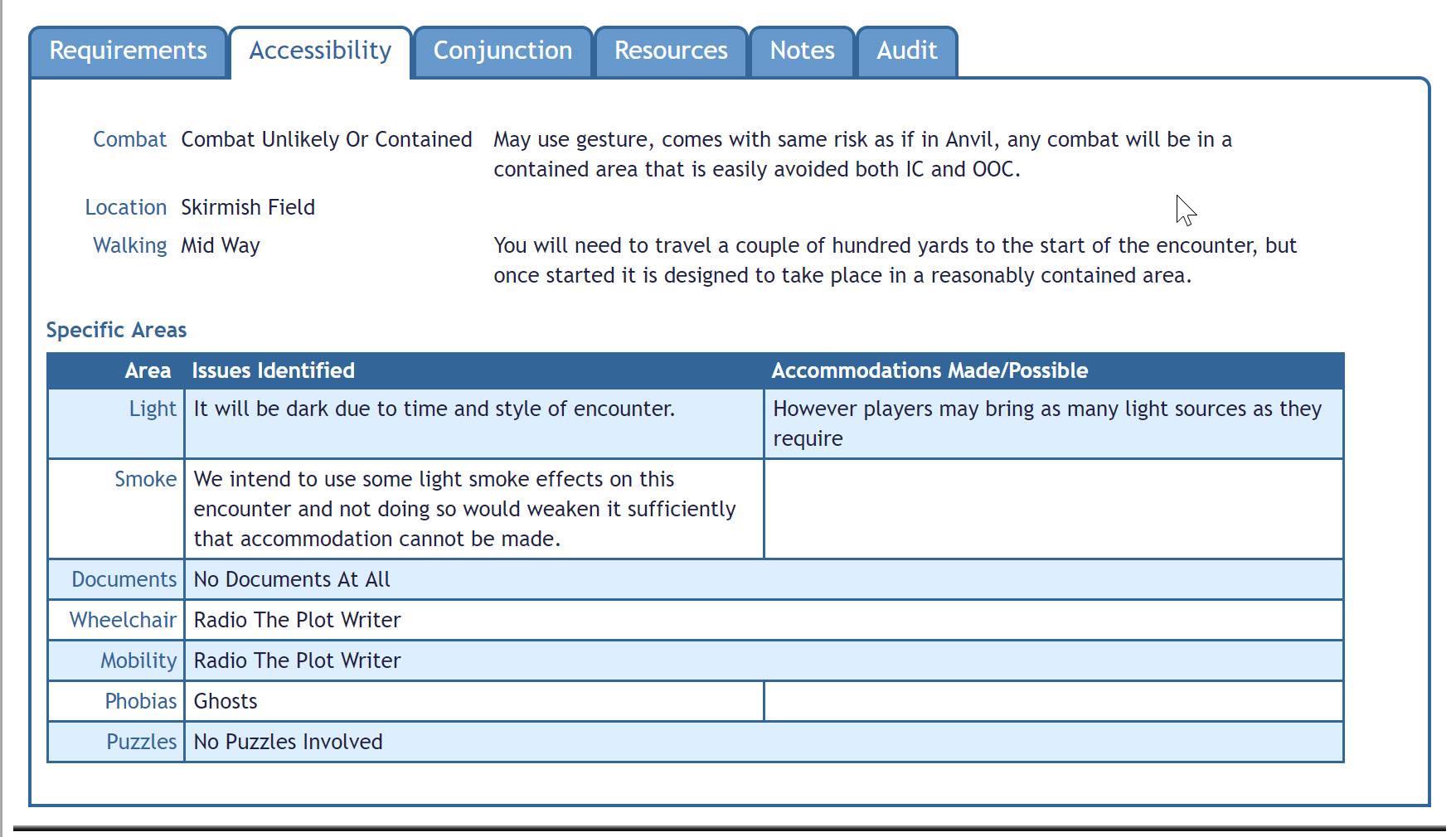Accessibility
Contents
Overview
We have added much more accessibility information to the plotmatron encounter system. This page outlines why we've done that and how to use it.
The current version of the accessibility information can be set for any encounter - but it is applies to encounters taking place off Anvil. Usually that means a conjunction, but it could also be an encounter accessed from the Hall of Worlds.
If your encounter is an Anvil field encounter - you can just skip this entire panel.
Why we have added accessibility information
We’re trying to stop the belief that there is one axis for accessibility which is “does the quest have a fight on it or not” and support people asking questions about the barriers might find on an encounter.
Refs/ some Egregores/GOD can all look up the information via the plotmatron, or radio plot support for additional information:
Here are the things we need to fill in:
Combat Level
This has changed only a very little since last year, but here’s a run down on what they mean:
| State | Means |
|---|---|
| Combat Highly Likely (includes battle) | Should only use non-contact gesture in emergency, should *not* go through gate if likely to need the gesture in a combat or if they will experience significant harm if accidentally hit |
| Combat Possible | May go through the gate planning to use the non-contact gesture, as long as they are aware that there is both an IC and OOC risk of being hit that is much higher than when using it in Anvil. |
| Combat Highly Unlikely or Contained | May use the non-contact gesture as needed. Comes with same risk as if in Anvil; any combat will be in a contained area that is easily avoided both IC and OOC. |
The key to understanding combat level is that it is NOT how likely a fight is to happen - you're not giving an overview of the fight - you're providing an answer to an individuals question of "How likely am I to be hit on this encounter?". An encounter to watch a duel between an Imperial champion and a Jotun champion is certain to include a fight - but a non-combatant can still go because the chances of them being attacked are actually minimal.
Distance and Terrain
To use our information on “where” so that they can consider both distance and terrain, people helping players will combine the information on location (woods, field or tents) with the new Distance element. This only needs to be completed for outdoor encounters. It relates to the fact that people with some conditions can fight, if the fight is in a relatively static area (eg walk to a summer regio for a trial Barien set up, then fight) but not if it also involves running all through the woods. These are the categories:
| State | Means |
|---|---|
| Free-ranging | You need to be able to roam the area to fully participate in this encounter. |
| Limited area – distant | You will need to travel a considerable distance to get to the start of the encounter, but once started it is designed to take place in a reasonably contained area. |
| Limited area – mid-way | You will need to travel a couple of hundred yards to the start of the encounter, but once started it is designed to take place in a reasonably contained area. |
| Limited area – close | This quest takes place in a limited area in the part of the field closest to the Sentinel Gate. |
Other Questions
This is the most complicated part. You can, if you need to, leave it to be radioed if anyone raises specific questions about your quest from this section. However the more information we can provide up front, the better. Crucially if you fill in this bit now... then we won't have to chase you up in the field if someone asks... a few minutes now will save you and everyone a bunch of hassle in the field...
There are 7 broad areas we expect people to ask about: Light; Smoke; Documents; Wheelchair, Mobility, Phobias and Puzzles
For each one you can choose from 4 options:
Each one has a “this will not come up” description such as “no puzzles in this encounter” or “fully wheelchair accessible. If you have thought about it, and can do then use these rather than Radio Plot Writer
The other single use option is: Radio Plot Writer - use that if a) you don’t have time to think through the possibilities or b) you need to check some things on site/conditions before commiting. (that should move more and more to b) as events progress and we get used to it)
Then we have “Issues Identified” and “Accommodations Made”
Issues Identified
Issues identified are “there is an access barrier that we don’t want to remove because it is fundamental to the encounter” such as “there will be spiders” for an Arhallogan encounter
Accommodations
Accommodations are either things we have done, or could do are things like “There is seating available” or “We plan to use a strobe, but will not if anyone who wants to go has issues”
Here’s an example of one after completion:
Note that usually I would expect Smoke to be offered as an accommodation that can be turned off - but for this encounter we’re experimenting with a concealed NPC, a phone and a bluetooth speaker to do “ghost as disemboided voice” so we really need the visibility dampener!
My Wheelchair and Mobility fields are set to radio, because until I have seen what state the copse is in, I don’t know where we are setting this yet.
